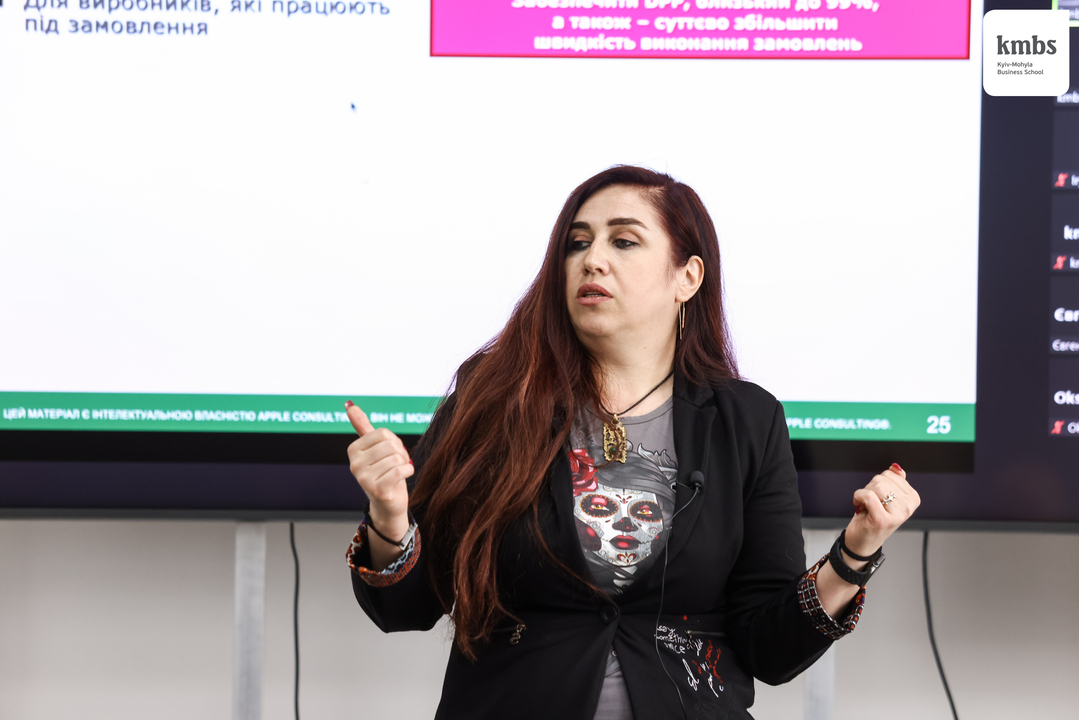Despite the introductory jokes, the topic of the school day turned out to be extremely serious. Lecturer Yuliya Plieva, an expert in strategic business management, engaged the program participants in a conversation about changes in company management, generously supplementing the theoretical material with examples from her own experience.
They mainly talked about improving operational processes according to the theory of constraints of the Israeli physicist Eliyahu Goldratt.
The aforementioned theory of constraints is based on finding and managing a key system constraint that affects the success and efficiency of the entire system. Thus, by making efforts to manage a very small number of aspects of the system, it is possible to achieve an effect that is far greater than that of simultaneously affecting all or most of the problem areas of the system at once or in turn. In the case of business, it is primarily about accelerating and increasing the generation of profit.
Based on the theory of limitations, the lecturer questioned the effectiveness of traditional management — a penny saves a hryvnia (if you are as efficient as possible at each link, you can earn more, that is, the global result is equal to the sum of local results). Ms. Yulia suggested that instead of improving each link, learn to identify the limitations of the production process and develop specific solutions for it.
Perhaps the most striking example in support of such an approach is responding to the need for product replenishment. Traditional operational processes are designed in such a way that replenishment can take several weeks. However, the lecturer is convinced that it is necessary to find ways to reduce the replenishment time. For example, if the constraint is how often and how much a company buys a product, then to reduce replenishment time, you can buy in smaller batches, but more often, to respond quickly to market needs. With this approach, the company earns not through savings, but through higher income.
Another example. If the products of the manufacturers are the same from the point of view of the market, the only criterion for comparison becomes the price. Accordingly, the market will prefer a lower price. In this case, you need to look for a differentiating factor — what makes the company's product stand out among similar but different manufacturers (for example, product manufacturing time or service quality). This is an additional value that lowers the price and makes the product better than competitors.
“Any improvement is a change, but not every change is an improvement. Our task is to ensure that 100% of the changes lead to improvement," says Yulia Plieva.
That is why the lecturer touched on the question of why not every change leads to improvement. Among the reasons is that the change is aimed not at the root problem, but at the symptoms. And also — the inability to "sell changes" within the organization in order to overcome internal resistance to changes. The matrix of changes proposed by E. Goldratt will help fight the latter.
Book recommendations
- Jeff Cox, Eliyahu Goldratt “Purpose. The process of continuous improvement"
A business novel will allow you to understand the global principles used in production, identify and get rid of project weaknesses, and even transfer new approaches to life outside the office. The author does not offer ready-made business advice, but presents a fascinating story about people trying to understand what drives their world and how to improve this process.
- E. M. Goldrath "Standing on the shoulders of giants"
The article analyzes the methodologies of Henry Ford, Taichi Ono, and Eliyahu Goldratt and presents four principles of flow management according to each operations management philosophy.
Read: https://cdn.ymaws.com/www.tocico.org/resource/resmgr/standing_on_the_shoulder_of_giants/standing_on_the_shoulders_of.pdf
_______________________________________________________________________
Info:
Yulia Plieva is an expert in strategic business management, marketing and sales specialist with significant international experience.
Founder, CEO of Apple Consulting®. He is engaged in operational management and strategic development of the company, which for 23 years has held leading positions in the market of Ukraine and abroad. As part of consulting projects, he helps clients develop and implement strategies and tactics of a high level of complexity. The company's clients include Halychyna, MOYO, PET Technologies, Collar, Bembi, Viola, SOVA, and others. Apple Consulting® is a pre-qualified consultant of the European Bank for Reconstruction and Development in the areas of "Strategy" and "Operational Processes". Also, the company, as a signatory of the UN Global Compact, implements Goal No. 8 "Promoting progressive, inclusive and sustainable economic growth, full and productive employment and decent work for all".
The author of a series of online courses on the Prometheus platform, a contributor to Forbes Ukraine. Since 2007, she has been a teacher of specialized MBA programs at the Kyiv-Mohyla Business School.










